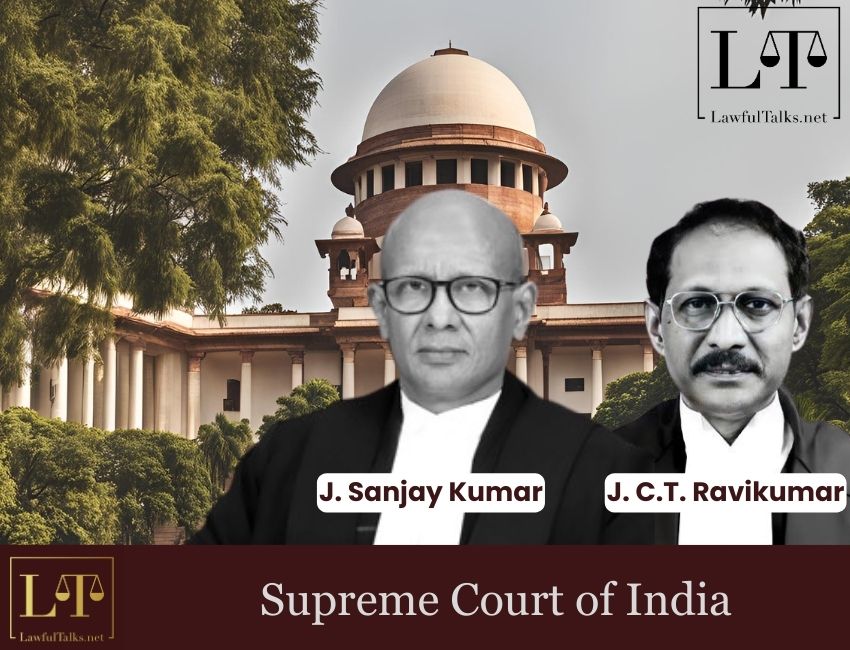Allahabad HC Sets Aside Afzal Ansari's Conviction, Allows Him to Continue as MP

In a recent judgment by a bench comprising Justice C.T. Ravikumar and Justice Sanjay Kumar, the Supreme Court of India clarified the scope of the High Court's power to quash criminal proceedings. The Court emphasized that, apart from the inherent power under Section 482 of the Criminal Procedure Code (Cr.P.C.), the High Court can invoke its extraordinary jurisdiction under Article 226 of the Constitution of India to quash a criminal case, especially to prevent the misuse of the law.
 The case arose when the appellant, Kim Wansoo, a foreign national and Project Manager of Hyundai Engineering & Construction India LLP, challenged an Allahabad High Court decision refusing to quash an FIR. The FIR, registered under various sections of the Indian Penal Code, alleged cheating, fraud, and criminal conspiracy, primarily relating to payment defaults of ₹9 crores arising from a chain of subcontractual agreements for a construction project.
The case arose when the appellant, Kim Wansoo, a foreign national and Project Manager of Hyundai Engineering & Construction India LLP, challenged an Allahabad High Court decision refusing to quash an FIR. The FIR, registered under various sections of the Indian Penal Code, alleged cheating, fraud, and criminal conspiracy, primarily relating to payment defaults of ₹9 crores arising from a chain of subcontractual agreements for a construction project.
Hyundai Motor India Limited had engaged Hyundai Engineering & Construction India LLP for the Gurgaon HMI Project. The latter subcontracted parts of the work to KOTEC Automotive Services India Private Limited, which further subcontracted with other entities, eventually involving the complainant, M/s RT Construction. The complainant alleged default in payments amounting to ₹9 crores and dishonor of cheques issued by the subcontractor, M/s YSSS India Construction, leading to financial hardship and personal losses, including the death of his brother.
Although notices were issued to the appellant under Section 91 of the Cr.P.C. to produce certain documents, the appellant contended that many of these were beyond his possession or control. The High Court, however, declined to quash the FIR, prompting the present appeal before the Supreme Court.
The Supreme Court noted the principles laid down in landmark cases such as State of Haryana v. Bhajan Lal and Pepsi Foods Ltd. v. Special Judicial Magistrate. These cases established that the High Court's power to quash criminal proceedings could be exercised under both Article 226 of the Constitution and Section 482 of the Cr.P.C. The Court reiterated that such powers are to be used judiciously, particularly to prevent abuse of the judicial process or secure the ends of justice.
The judgment further scrutinized the FIR's allegations, observing that they failed to disclose the commission of any offence against the appellant. The Court pointed out that the vague and generalized accusations in the FIR, even if taken at face value, could not constitute a valid case for prosecution against the appellant. The judgment emphasised that compelling an individual to face trial under such circumstances would amount to an abuse of the legal process, leading to a miscarriage of justice.
The Court also reaffirmed its stance from Mohammad Wajid v. State of Uttar Pradesh, highlighting that courts must go beyond the mere text of the FIR to consider broader contextual and circumstantial elements when evaluating allegations.
Concluding the matter, the Supreme Court allowed the appeal, setting aside the Allahabad High Court's judgment. It quashed the FIR registered against the appellant.
Case Title: Kim Wansoo Versus State of Uttar Pradesh & Ors.




















































































































































































































































































































































































































































































































































































































































































































































































































